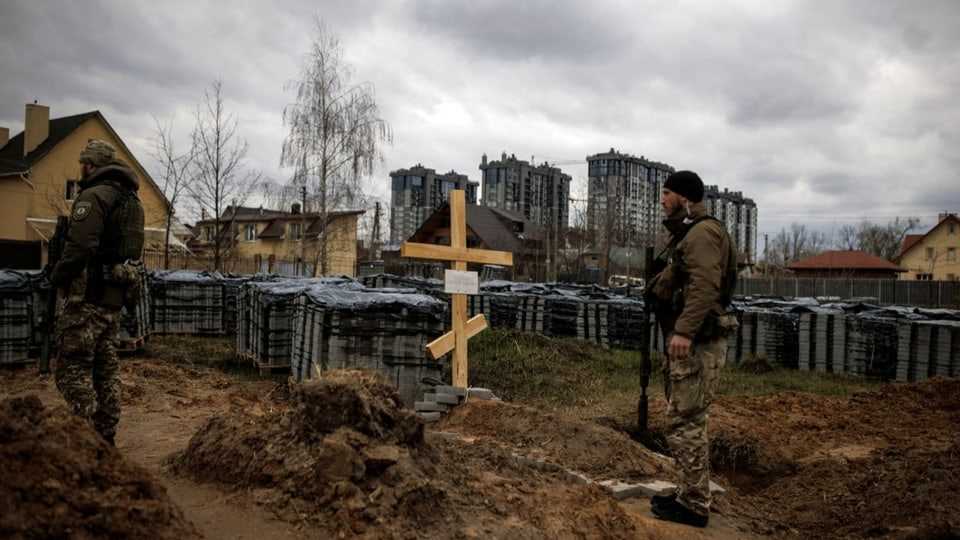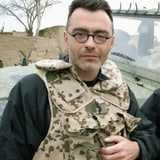For many, the atrocities in Bucha are a turning point: it became painfully clear what is happening in this war and how great the suffering of the civilian population is. A few days ago, journalist Christoph Reuter was in the small town of Trostianets, not far from Kharkiv in eastern Ukraine. Trostianets was occupied by Russian troops early in the war but was liberated by Ukrainian forces last week. Reuter and his colleagues visited the city shortly after the liberation – there, too, a pattern of random murders and looting similar to that in Bucha was found.
SRF News: What did you find in Trostjanets?
Christoph Reuter: What was fascinating about Trostjanez was that we came at a point in time when the residents themselves were only just beginning to dare to leave their houses. There was no land line, no cell phone, so they didn’t even know if the Russians were really gone. We saw the state left by the Russian army when it left. Near the police headquarters we discovered the body of a civilian, which was also desecrated. Someone had left a pile of feces on her.
The shops had been shot up and looted, the tills blown up. We found part of the looted goods in the army quarters. Grocery wrappers, children’s clothes that the soldiers used to line their dugouts to keep them warm. We have found evidence of how a Russian army unit behaves when it occupies a city for a month whose residents all oppose it.
Did the people there tell you how they experienced the occupation?
Yes, very detailed. In the beginning, the Russians came like a scattered force that didn’t have much to do with the residents. But after three days they ran out of food. Then they were fired upon by the Ukrainian army and assumed – rightly so – that the local population would give them the coordinates of the tank positions. And the nightmare began. A curfew was imposed from 3 p.m. Anyone who was outside after that was shot. We don’t know exactly how many people were shot. But we saw graves in the gardens behind the houses in several places because most of the residents were forbidden to go to the cemetery. The Russians had mined it.
Within four weeks, the Russians went from being a force that wanted little to do with the people to a murderous squad of soldiers who shoot anyone who gets too close.
What was striking about the tales was that the Russians had not come with a fixed plan. Apparently they didn’t know what they wanted in Trostianets. Within four weeks, they went from being a force that wanted little to do with humans to a murderous squad of soldiers who shoot anyone who gets too close.

Legend:
As here in Bucha, people in Trostianets are supposed to bury their relatives in a makeshift way.
Reuters
Did Trostianets residents also talk to Russian soldiers? Did they know what they were doing, were they acting on orders?
No, there was no order to act like that. But there was also no order not to act in this way. It was chaos and utter arbitrariness. They could do whatever they wanted. The Russians only spoke to a few local people. In mid-March they wanted to know from some of the villagers whether their troops had already conquered Kyiv or Kharkiv, and whether Zelensky was already dead. It’s as if these Russian troops, who were a wild mix of mercenaries from South Ossetia or from the poorest corner of Siberia, didn’t even know what they were doing there.
So that means: In view of the pictures they describe to us, Butscha is not an isolated case.
No. I think Butscha is a more extreme case than others, because there was very heavy fighting there. The Ukrainians tried everything to prevent the Russian troops from advancing further towards Kyiv. The attackers acted much more cruelly there than in Trostianets. There were dozens of bodies lying on the side of the road. The pattern, the system, that nobody stops these soldiers from looting, killing and torturing civilians – that can be seen in Bucha as well as in Trostianets. And probably everywhere you go, if that’s where the Russian troops retreat.
The conversation was conducted by Simone Hulliger.
